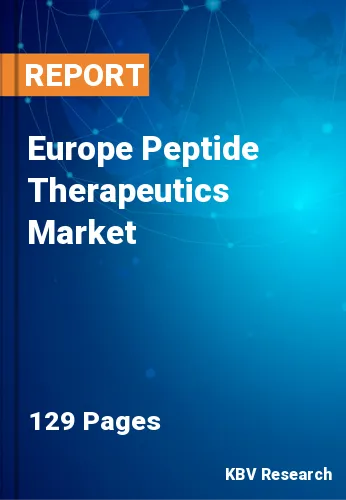The Europe Peptide Therapeutics Market would witness market growth of 5.6% CAGR during the forecast period (2022-2028).
Peptide medications have so many desired qualities, they are transitory in the body due to quick degradation and clearance. Many approaches have been used to boost the stability of peptide therapeutics. Some peptides and proteins have half-lives of only a few minutes, making them inefficient for medication delivery. Peripheral blood-mediated proteolysis, real and hepatic evacuation, and receptor-mediated endocytosis are all mechanisms implicated in their clearance. The molecular weight of the substance is one of the key reasons for its quick clearance.
In Europe, cardiovascular diseases (CVD) continue to be the primary cause of death, accounting for 45% of all deaths in the region, according to the National Library of Medicines. Every year, more than 4 million Europeans die from cardiovascular disease (CVD), mostly coronary heart disease (CHD) and stroke. Many more are admitted to hospitals, and several others acquire long-term disabilities that necessitate lifetime therapies. CVD has huge economic ramifications for Europe, in addition to human misery. CVD is predicted to cost the EU economy €210 billion per year, which includes direct healthcare expenses as well as non-health expenditures such as lost productivity and informal care for people with CVD. The cardiovascular disease mortality rate in Central and Eastern Europe (CEE/CIS) is the highest in the world.
CVD death rates are greater in CEE and CIS, and they occur at younger ages as well. Premature CVD mortality among men in Russia and Belarus (65 years) is more than ten times greater than in Switzerland (300 vs. 26 per 100 000, respectively). Men aged 55–59 years in various CIS nations (Belarus, Kazakhstan, Kyrgyzstan, Russia, and Ukraine) have a higher CVD death rate than men aged 75–79 years in France. When comparing CEE to other European countries, women's premature death patterns are similar to men's, however at lower rates. The requirement for an effective treatment approach for these disorders is at its peak in the region. The adoption of peptide therapeutics is estimated to surge due to this.
The Germany market dominated the Europe Peptide Therapeutics Market by Country in 2021, and would continue to be a dominant market till 2028; thereby, achieving a market value of $3,458.3 million by 2028. The UK market is estimated to grow at a CAGR of 4.7% during (2022 - 2028). Additionally, The France market would witness a CAGR of 6.3% during (2022 - 2028).
Based on Type, the market is segmented into Innovative and Generic. Based on Route of Administration, the market is segmented into Parenteral Route, Pulmonary, Mucosal, Oral Route, and Others. Based on Synthesis Technology, the market is segmented into Liquid Phase Peptide Synthesis (LPPS), Solid Phase Peptide Synthesis (SPPS), and Hybrid Technology. Based on Type of Manufacturers, the market is segmented into In-house and Outsourced. Based on Application, the market is segmented into Metabolic, Cardiovascular Disorder, GIT & Renal, Antiinfection & Dermatology, Respiratory, Central Nervous System, Cancer, Pain, and Others. Based on countries, the market is segmented into Germany, UK, France, Russia, Spain, Italy, and Rest of Europe.
Free Valuable Insights: The Global Peptide Therapeutics Market will Hit $58.4 Billion by 2028, at a CAGR of 6.3%
The market research report covers the analysis of key stake holders of the market. Key companies profiled in the report include Eli Lilly And Company, AstraZeneca PLC, Teva Pharmaceuticals Industries Ltd., Novartis AG, Pfizer, Inc., Sanofi S.A., GlaxoSmithKline PLC, Takeda Pharmaceutical Company Limited, Lonza Group AG, and Amgen, Inc.
By Type
By Route of Administration
By Synthesis Technology
By Type of Manufacturers
By Application
By Country
Our team of dedicated experts can provide you with attractive expansion opportunities for your business.

